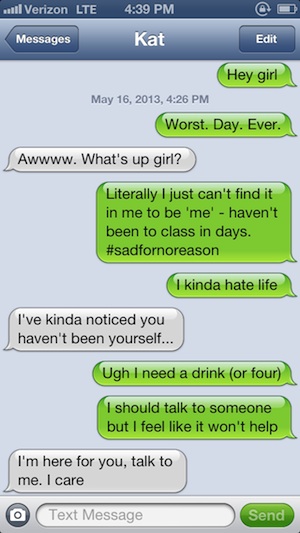Mental Health
It is difficult to tell if a friend or fellow Hoosier is struggling with severe stress or a mental illness. Signs and symptoms are rarely clear-cut.
Sometimes being a friend means mastering the art of timing. There is a time for silence, a time to let go and allow people to hurl themselves into their own destiny, and a time to prepare to pick up the pieces when it’s all over.
Gloria Naylor
What We Know
- 31% of college students felt “so depressed it was difficult to function”
- 51% of college students felt overwhelming anxiety
- 1 in 10 college students were diagnosed with depression
- 6% of college students seriously considered suicide
What Can We Do?
Trust your gut.
Watch out for changes in
- Sleep
- Mood—sad, anxious, irritable
- Appetite or eating habits or weight
- Energy level
- Interest or motivation
- Performance or participation—in school, work, chapter activities, or relationships
- Body image
Other signs of a potential problem include
- Increased use of alcohol or drugs paired with an increased tolerance
- Unhealthy or excessive exercise
- Vomiting after eating
- Arguments, fights, unusual or exaggerated reactions to events or people
- Self-injury—intentionally cutting, burning, bruising, punching one’s self
- Thoughts, comments, or writings of death or suicide
Take Action
Take Action
Your intuition is usually correct. If your friend is displaying any signs or symptoms of a potential problem, have the #CouragetoCare and step up.
The more signs you observe, the more serious the problem could be, try
- Starting a conversation with your friend about your concerns and willingness to help.
- Stating the symptoms that you’ve noticed—using ‘I’ statements—“I’ve noticed…”
- Asking thoughtful questions.
- Encouraging your friend to connect with campus and community resources for help from professionals.
Say things like…
- “I noticed you haven’t been going to class this week, and you’ve been having trouble sleeping too”
- “So, when I saw those things, I started wondering how you’re doing. How are you doing?”
- “Sometimes when people are feeling really bad, they have thoughts about death or suicide. Have you had any of these thoughts?”
- “Have you heard of CAPS? They see over 3,000 IU students every year. CAPS counselors can help you identify some ways to feel better and get back on track. How about making a free appointment? I can even walk with you to the appointment, if you want me to.”
- "Maybe this is something that shouldn’t wait. How about if I walk with you to the crisis walk-in counseling at CAPS?”
If you aren't sure about what to say or how to start the conversation, counselors are available through the IU Counseling Center (CAPS) hotline at 812-855-5711 to help talk you through what you might say or what you can do. Do not hesitate to call 9-1-1 in case of an emergency!



